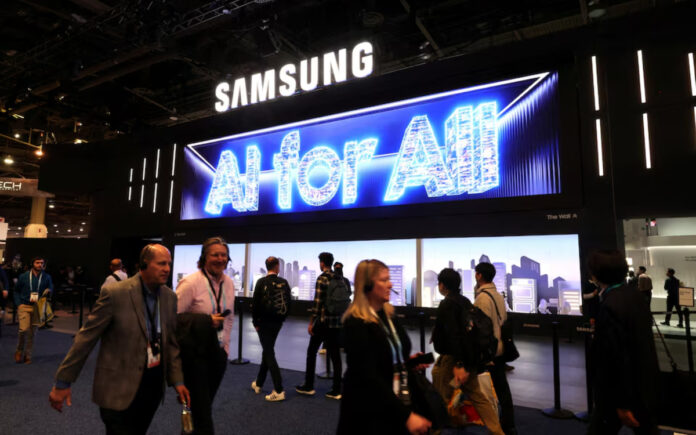Seoul: Samsung Electronics has announced its commitment to focusing on high-end chip production while reporting progress on a major supply agreement, aiming to address investor concerns stemming from a staggering 40% quarter-on-quarter profit decline in its semiconductor division.
The announcement, made by an executive during an earnings call, resulted in a more than 3% surge in Samsung’s stock on Thursday, reversing earlier losses. Despite this rebound, the company has experienced one of the worst performances among major chipmakers this year, with its stock plummeting nearly 25% as it struggles to keep pace with rivals such as TSMC and SK Hynix, both of which reported record third-quarter earnings fueled by the AI boom.
“While there was a delay in commercializing HBM3E sales as we had flagged earlier, we have made meaningful progress in the product’s qualification test process with a major customer,” said Samsung Executive Vice President Jaejune Kim, referring to high-end memory chips essential for AI chipsets. “As a result, we expect improved HBM3E sales in the fourth quarter and plan to expand sales to multiple customers.”
Although the company did not disclose the identity of the major client, analysts speculate that the qualification tests have been conducted by Nvidia, which holds approximately 80% of the global AI chip market. Reuters has previously reported that Samsung’s HBM3E chips successfully passed Nvidia’s testing protocols for use in its processors.
“Samsung’s comments suggest that the company is expected to finally supply HBM3E chips to Nvidia, clearing a major hurdle in its HBM business,” noted Ryu Young-ho, a senior analyst at NH Investment & Securities. In contrast, shares of SK Hynix dropped as much as 4.6% on Thursday due to concerns over potential oversupply of HBM chips following Samsung’s statements.
While the sluggish chip market leaves little room for optimism, artificial intelligence remains a bright spot. However, Samsung faces challenges in supplying the high-end semiconductors required for AI applications, rendering it more vulnerable to waning demand for traditional chips used in PCs and smartphones.
“In the fourth quarter, while memory chip demand for mobile and PC may encounter softness, growth in AI will keep demand at robust levels,” Samsung stated in its earnings announcement. “Against this backdrop, the company will concentrate on driving sales of High Bandwidth Memory (HBM) and high-density products.”
As the world’s largest producer of memory chips, smartphones, and televisions, Samsung also cautioned about limited earnings growth in the current quarter due to intensifying competition within the consumer electronics sector during the crucial year-end sales period.
Samsung reported an operating profit of 9.2 trillion won ($6.66 billion) for the July to September period, significantly higher than the 2.4 trillion won from the same quarter last year but down from 10.4 trillion won in the previous quarter. This result was slightly above Samsung’s preliminary estimate of 9.1 trillion won disclosed earlier this month, which had initially fallen short of market expectations.
This month, Samsung issued a rare apology for its disappointing earnings, attributing them to “delays” in sales of advanced chips and the rising supply of traditional chips from Chinese competitors.
Gradual Recovery in Chip Production
The chip division rebounded to an operating profit of 3.9 trillion won in the third quarter, up from a loss of 3.8 trillion won a year earlier, but this figure is down from 6.45 trillion won in the previous quarter. Samsung attributed its chip earnings decline to one-off expenses, including employee incentives, as well as currency effects stemming from a weak dollar.
“Samsung hasn’t commercialized HBM as effectively as its competitors, so its third-quarter performance and fourth-quarter outlook are falling short of market expectations,” commented Baik Gil-hyun, an analyst at Yuanta Securities. “It’s anticipated that it will take some time before the business performs as expected.”
Also Read | Judge Orders Elon Musk to Court Over Controversial $1 Million Election Giveaway
In contrast, SK Hynix reported a record third-quarter operating profit of 7 trillion won, bolstered by AI chip sales to Nvidia.
Samsung continues to struggle against rivals not only in its core memory chip business but also in its foundry division, which designs and manufactures logic chips for other clients. Analysts indicate that Samsung’s logic chip business experienced widening losses in the third quarter.
Also Read | AstraZeneca, Bristol Myers Squibb, and Johnson & Johnson Challenge U.S. Drug Pricing Mandate
Additionally, Samsung has delayed receiving deliveries of ASML’s high-end chipmaking equipment for its upcoming factory in Texas, as the company has yet to secure any major customers for the project.
The mobile devices division also saw its third-quarter operating profit decline to 2.8 trillion won from 3.3 trillion won a year earlier.



